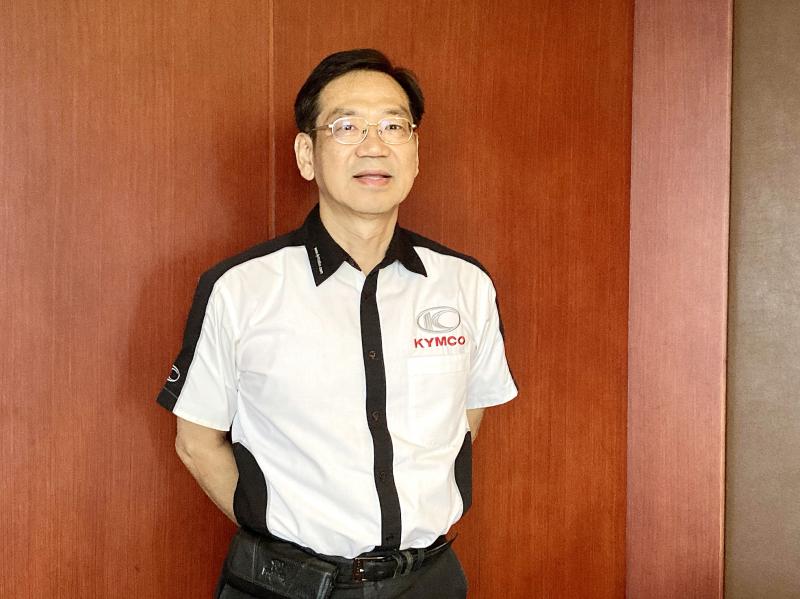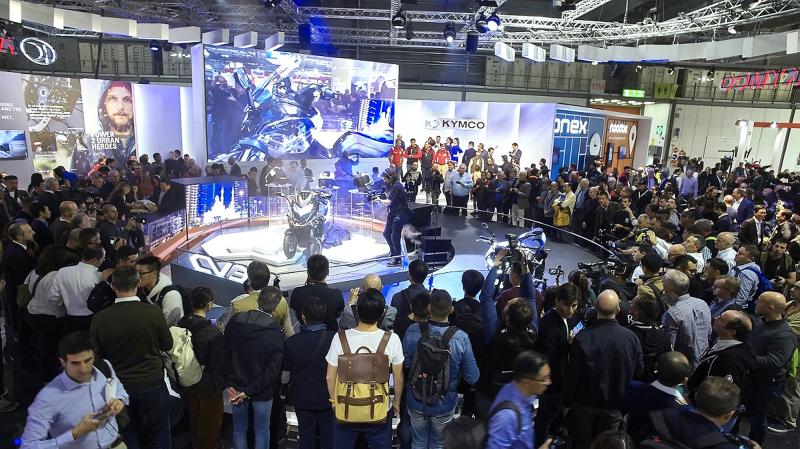Taipei Times: Did the COVID-19 pandemic reduce scooter sales in Taiwan and curtail Kwang Yang Motor Co’s (光陽工業) shipments?
Ko Chun-ping (柯俊斌): In Taiwan, the pandemic has barely affected the company’s scooter sales, thanks to the government’s better control of the pandemic. It is true that consumers at first had a wait-and-see attitude toward scooter purchases in February and March when local infections started to emerge, but the government’s quick response to rein in the spread of the virus helped calm the public’s nerves. Our sales [by unit] bounced back afterward, bringing total sales up 2 percent year-on-year in the first half of this year. Likewise, overall scooter sales in Taiwan grew 2 percent annually to 403,199 units in the first six months of the year. For the full year, we expect that scooter sales in Taiwan might be similar to last year’s number of about 900,000 units, or pick up a little bit.
TT: As progress fighting the spread of COVID-19 is uneven around the world, how has the disease affected sales of KYMCO scooters overseas?

Photo: Lisa Wang, Taipei Times
Ko: The pandemic has had a bigger impact on our sales overseas, and we have seen a year-on-year decline of 20 to 30 percent thus far. By country, the spread of the virus is still very severe in Africa and Latin America, where Brazil, Argentina and Colombia are our major markets. Because of the lockdown measures imposed by governments there, customers have temporarily paused orders as consumers are restricted from going out to shop. Besides, based on feedback from our customers, there are still some inventories that need to be digested before new orders can be placed.
Orders from European markets have recovered lately as some countries are reopening their economies gradually, as infections are under control. Currently, Spain, France and Italy are our top markets in Europe, and we are seeing orders from European markets rebound and approach normal levels. In particular, orders this month have surpassed those we received during the same month last year. Looking ahead, we are positive about the outlook for European markets as scooter distributors and shops need to buy environmentally friendly scooters in preparation for the implementation of new Euopean emission rules that are to take effect in January next year. Therefore, we expect our employees to have to start working overtime in the second half of the year, which has been the norm for us for years.
TT: How did adjustments in tax incentives and subsidies from the government change the landscape of the domestic scooter market this year?

Photo courtesy of Kwang Yang Motor Co
Ko: Electric scooter makers are heavily reliant on the central and local governments’ subsidies to sell their products due to their high price tags. Last year, strong subsidies boosted sales of electric scooters significantly from Gogoro Inc (睿能創意) and members of the Powered by Gogoro Network, such as Yamaha Motor Taiwan Co (台灣山葉). That brought electric scooter makers’ local market share to a combined 18.7 percent.
However, electric scooter sales took a nosedive in January and only accounted for about 4.5 percent of total scooter sales in Taiwan, as the central and local governments for the first time included fuel-powered scooters in the tax incentive program that subsidizes purchases of new scooters to retire old ones. Total subsidies can be up to NT$13,300 per vehicle, including tax refunds, for purchases of scooters equipped with an anti-lock braking system, or a combined braking system, as well as a rebate of 17 percent in commodity tax.
Our efforts to promote tax equity starting last year are also affecting electric scooter sales. About eight counties, or half of the nation’s local governments, supported our appeal and granted tax refunds and subsidies for purchases of fuel-powered and electric scooters, which began this year. As a result, electric scooter makers no longer enjoy preferential status.
With the new tax incentives in place for the remainder of the year, electric scooter sales could drop a bit more. Besides, Gogoro recalled some scooters due to technical problems, which has also raised the public’s concern over the electric model’s safety. Meanwhile, rapid sales growth also resulted in an insufficient supply of fully charged batteries. In my view, all these factors are likely to lead to falling electric scooters sales this year.
TT: The Ministry of Finance has proposed extending the tax refund program for five years to accelerate the phasing out of older and less environmentally friendly scooters, as the existing program is to expire at the end of this year. Do you think the ministry’s proposal is a boon for scooter makers?
Ko: Not really. It is baffling because we had not heard of this ministry proposal until recently. Furthermore, as the tax incentive program has been in place for five years, the effect is softening, as a high percentage of old scooters have been replaced. For instance, only half of KYMCO scooter buyers applied for government subsidies recently, down from 70 percent last year. Besides, it is a complicated process to get government subsidies, as applicants need to fill in at least 15 application forms from five government agencies. To us, the tax refund program is a short-term substitute before the commodity tax is eliminated. The ministry has promised to scrap the tax entirely, but no timetable has been given.
TT: Kwang Yang has been calling on the government to cancel the 17 percent commodity tax on scooters. Why is that?
Ko: From our point of view, scooters are no longer considered luxury goods, but an important mobility option for commuters — especially for lower-income earners. In most cases, commodity taxes are levied only on luxury goods such as cars. Taiwan is one of the few countries in the world that still has the extra levy on scooters, and the tax adds a financial burden on consumers, as the prices of scooters are rising due to increasing costs. The total cost of a new and greener scooter that meets the government’s latest Phase 7 emissions standards is at least two times higher than for one meeting the Phase 1 emissions standards.
To meet growing stringent emissions rules, Kwang Yang invests up to NT$2 billion [US$67.54 million] a year in research and development. Our R&D staff has risen to about 700 people. However, as one of the nation’s manufacturers, we are only asking to make a decent gross margin of 5 percent.
For the ministry, the commodity tax on scooters contributed a net NT$3 billion to the national coffers, which is a very minimal portion of the total tax revenue. The ministry has seen tax revenue surpass its forecast by more than NT$50 billion per year over the past few years. So why does it bother to continue this tax? If the ministry decides not to get rid of the commodity tax, it should at least halve the 17 percent tax rate on fuel-powered scooters to match the 8.5 percent rate on electric scooters, in our opinion.

Taiwan Semiconductor Manufacturing Co (TSMC, 台積電) would not produce its most advanced technologies in the US next year, Minister of Economic Affairs J.W. Kuo (郭智輝) said yesterday. Kuo made the comment during an appearance at the legislature, hours after the chipmaker announced that it would invest an additional US$100 billion to expand its manufacturing operations in the US. Asked by Taiwan People’s Party Legislator-at-large Chang Chi-kai (張啟楷) if TSMC would allow its most advanced technologies, the yet-to-be-released 2-nanometer and 1.6-nanometer processes, to go to the US in the near term, Kuo denied it. TSMC recently opened its first US factory, which produces 4-nanometer

GREAT SUCCESS: Republican Senator Todd Young expressed surprise at Trump’s comments and said he expects the administration to keep the program running US lawmakers who helped secure billions of dollars in subsidies for domestic semiconductor manufacturing rejected US President Donald Trump’s call to revoke the 2022 CHIPS and Science Act, signaling that any repeal effort in the US Congress would fall short. US Senate Minority Leader Chuck Schumer, who negotiated the law, on Wednesday said that Trump’s demand would fail, while a top Republican proponent, US Senator Todd Young, expressed surprise at the president’s comments and said he expects the administration to keep the program running. The CHIPS Act is “essential for America leading the world in tech, leading the world in AI [artificial

REACTIONS: While most analysts were positive about TSMC’s investment, one said the US expansion could disrupt the company’s supply-demand balance Taiwan Semiconductor Manufacturing Co’s (TSMC, 台積電) new US$100 billion investment in the US would exert a positive effect on the chipmaker’s revenue in the medium term on the back of booming artificial intelligence (AI) chip demand from US chip designers, an International Data Corp (IDC) analyst said yesterday. “This is good for TSMC in terms of business expansion, as its major clients for advanced chips are US chip designers,” IDC senior semiconductor research manager Galen Zeng (曾冠瑋) said by telephone yesterday. “Besides, those US companies all consider supply chain resilience a business imperative,” Zeng said. That meant local supply would

BIG INVESTMENT: Hon Hai is building the world’s largest assembly plant for servers based on Nvidia Corp’s state-of-the-art AI chips, Jalisco Governor Pablo Lemus said The construction of Hon Hai Precision Industry Co’s (鴻海精密) massive artificial intelligence (AI) server plant near Guadalajara, Mexico, would be completed in a year despite the threat of new tariffs from US President Donald Trump, Jalisco Governor Pablo Lemus said. Hon Hai, also known as Foxconn Technology Group (富士康科技集團), is investing about US$900 million in what would become the world’s largest assembly plant for servers based on Nvidia Corp’s state-of-the-art GB200 AI chips, Lemus said. The project consists of two phases: the expansion of an existing Hon Hai facility in the municipality of El Salto, and the construction of a